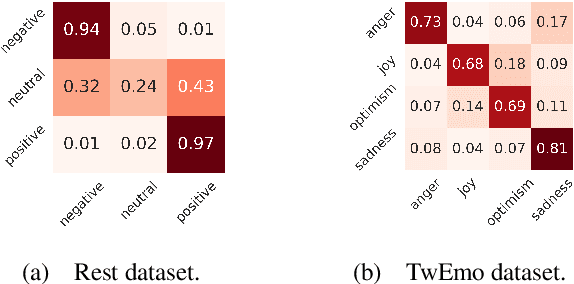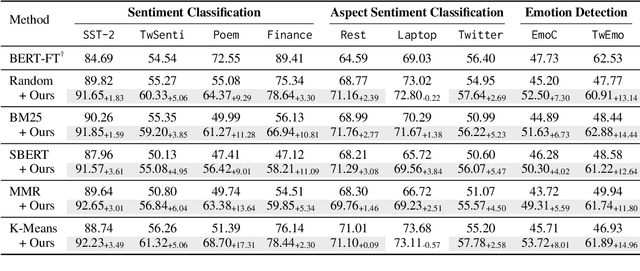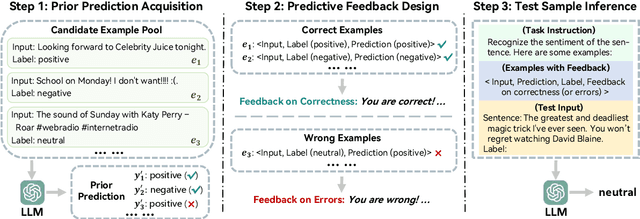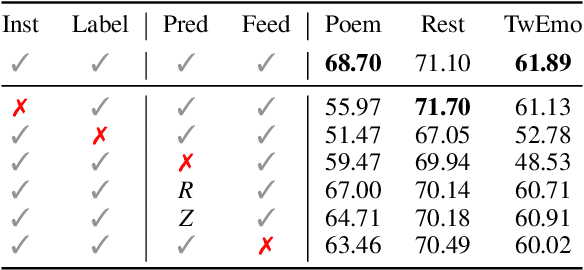Hongling Xu
HS-STAR: Hierarchical Sampling for Self-Taught Reasoners via Difficulty Estimation and Budget Reallocation
May 26, 2025Abstract:Self-taught reasoners (STaRs) enhance the mathematical reasoning abilities of large language models (LLMs) by leveraging self-generated responses for self-training. Recent studies have incorporated reward models to guide response selection or decoding, aiming to obtain higher-quality data. However, they typically allocate a uniform sampling budget across all problems, overlooking the varying utility of problems at different difficulty levels. In this work, we conduct an empirical study and find that problems near the boundary of the LLM's reasoning capability offer significantly greater learning utility than both easy and overly difficult ones. To identify and exploit such problems, we propose HS-STaR, a Hierarchical Sampling framework for Self-Taught Reasoners. Given a fixed sampling budget, HS-STaR first performs lightweight pre-sampling with a reward-guided difficulty estimation strategy to efficiently identify boundary-level problems. Subsequently, it dynamically reallocates the remaining budget toward these high-utility problems during a re-sampling phase, maximizing the generation of valuable training data. Extensive experiments across multiple reasoning benchmarks and backbone LLMs demonstrate that HS-STaR significantly outperforms other baselines without requiring additional sampling budget.
DAST: Difficulty-Aware Self-Training on Large Language Models
Mar 12, 2025Abstract:Present Large Language Models (LLM) self-training methods always under-sample on challenging queries, leading to inadequate learning on difficult problems which limits LLMs' ability. Therefore, this work proposes a difficulty-aware self-training (DAST) framework that focuses on improving both the quantity and quality of self-generated responses on challenging queries during self-training. DAST is specified in three components: 1) sampling-based difficulty level estimation, 2) difficulty-aware data augmentation, and 3) the self-training algorithm using SFT and DPO respectively. Experiments on mathematical tasks demonstrate the effectiveness and generalization of DAST, highlighting the critical role of difficulty-aware strategies in advancing LLM self-training.
Distilling Fine-grained Sentiment Understanding from Large Language Models
Dec 24, 2024Abstract:Fine-grained sentiment analysis (FSA) aims to extract and summarize user opinions from vast opinionated text. Recent studies demonstrate that large language models (LLMs) possess exceptional sentiment understanding capabilities. However, directly deploying LLMs for FSA applications incurs high inference costs. Therefore, this paper investigates the distillation of fine-grained sentiment understanding from LLMs into small language models (SLMs). We prompt LLMs to examine and interpret the sentiments of given reviews and then utilize the generated content to pretrain SLMs. Additionally, we develop a comprehensive FSA benchmark to evaluate both SLMs and LLMs. Extensive experiments on this benchmark reveal that: (1) distillation significantly enhances the performance of SLMs in FSA tasks, achieving a 6.00\% improvement in $F_1$-score, and the distilled model can outperform Llama-2-7b with only 220M parameters; (2) distillation equips SLMs with excellent zero-shot sentiment classification capabilities, enabling them to match or even exceed their teacher models. These results suggest that distillation from LLMs is a highly promising direction for FSA. We will release our code, data, and pretrained model weights at \url{https://github.com/HITSZ-HLT/FSA-Distillation}.
DS$^2$-ABSA: Dual-Stream Data Synthesis with Label Refinement for Few-Shot Aspect-Based Sentiment Analysis
Dec 19, 2024



Abstract:Recently developed large language models (LLMs) have presented promising new avenues to address data scarcity in low-resource scenarios. In few-shot aspect-based sentiment analysis (ABSA), previous efforts have explored data augmentation techniques, which prompt LLMs to generate new samples by modifying existing ones. However, these methods fail to produce adequately diverse data, impairing their effectiveness. Besides, some studies apply in-context learning for ABSA by using specific instructions and a few selected examples as prompts. Though promising, LLMs often yield labels that deviate from task requirements. To overcome these limitations, we propose DS$^2$-ABSA, a dual-stream data synthesis framework targeted for few-shot ABSA. It leverages LLMs to synthesize data from two complementary perspectives: \textit{key-point-driven} and \textit{instance-driven}, which effectively generate diverse and high-quality ABSA samples in low-resource settings. Furthermore, a \textit{label refinement} module is integrated to improve the synthetic labels. Extensive experiments demonstrate that DS$^2$-ABSA significantly outperforms previous few-shot ABSA solutions and other LLM-oriented data generation methods.
Improving In-Context Learning with Prediction Feedback for Sentiment Analysis
Jun 05, 2024



Abstract:Large language models (LLMs) have achieved promising results in sentiment analysis through the in-context learning (ICL) paradigm. However, their ability to distinguish subtle sentiments still remains a challenge. Inspired by the human ability to adjust understanding via feedback, this paper enhances ICL by incorporating prior predictions and feedback, aiming to rectify sentiment misinterpretation of LLMs. Specifically, the proposed framework consists of three steps: (1) acquiring prior predictions of LLMs, (2) devising predictive feedback based on correctness, and (3) leveraging a feedback-driven prompt to refine sentiment understanding. Experimental results across nine sentiment analysis datasets demonstrate the superiority of our framework over conventional ICL methods, with an average F1 improvement of 5.95%.
 Add to Chrome
Add to Chrome Add to Firefox
Add to Firefox Add to Edge
Add to Edge